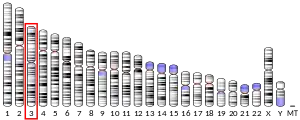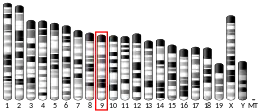TMEM158
Transmembrane protein 158 is a protein that in humans is encoded by the TMEM158 gene.[5][6][7]
| TMEM158 | |||||||||||||||||||||||||
|---|---|---|---|---|---|---|---|---|---|---|---|---|---|---|---|---|---|---|---|---|---|---|---|---|---|
| Identifiers | |||||||||||||||||||||||||
| Aliases | TMEM158, BBP, RIS1, p40BBP, transmembrane protein 158 (gene/pseudogene), transmembrane protein 158 | ||||||||||||||||||||||||
| External IDs | MGI: 1919559 HomoloGene: 9141 GeneCards: TMEM158 | ||||||||||||||||||||||||
| |||||||||||||||||||||||||
| |||||||||||||||||||||||||
| Orthologs | |||||||||||||||||||||||||
| Species | Human | Mouse | |||||||||||||||||||||||
| Entrez | |||||||||||||||||||||||||
| Ensembl | |||||||||||||||||||||||||
| UniProt | |||||||||||||||||||||||||
| RefSeq (mRNA) | |||||||||||||||||||||||||
| RefSeq (protein) | |||||||||||||||||||||||||
| Location (UCSC) | Chr 3: 45.22 – 45.23 Mb | Chr 9: 123.26 – 123.26 Mb | |||||||||||||||||||||||
| PubMed search | [3] | [4] | |||||||||||||||||||||||
| Wikidata | |||||||||||||||||||||||||
| |||||||||||||||||||||||||
Constitutive activation of the Ras pathway triggers an irreversible proliferation arrest reminiscent of replicative senescence. Transcription of this gene is upregulated in response to activation of the Ras pathway, but not under other conditions that induce senescence.
The encoded protein is similar to a rat cell surface receptor proposed to function in a neuronal survival pathway[7]
References
- GRCh38: Ensembl release 89: ENSG00000249992 - Ensembl, May 2017
- GRCm38: Ensembl release 89: ENSMUSG00000054871 - Ensembl, May 2017
- "Human PubMed Reference:". National Center for Biotechnology Information, U.S. National Library of Medicine.
- "Mouse PubMed Reference:". National Center for Biotechnology Information, U.S. National Library of Medicine.
- Hama T, Maruyama M, Katoh-Semba R, Takizawa M, Iwashima M, Nara K (Aug 2001). "Identification and molecular cloning of a novel brain-specific receptor protein that binds to brain injury-derived neurotrophic peptide. Possible role for neuronal survival". J Biol Chem. 276 (34): 31929–35. doi:10.1074/jbc.M100617200. PMID 11399754.
- Barradas M, Gonos ES, Zebedee Z, Kolettas E, Petropoulou C, Delgado MD, Leon J, Hara E, Serrano M (Feb 2002). "Identification of a candidate tumor-suppressor gene specifically activated during Ras-induced senescence". Exp Cell Res. 273 (2): 127–37. doi:10.1006/excr.2001.5434. PMID 11822868.
- "Entrez Gene: TMEM158 transmembrane protein 158".
Further reading
- Iglesias D, Fernández-Peralta AM, Nejda N, et al. (2006). "RIS1, a gene with trinucleotide repeats, is a target in the mutator pathway of colorectal carcinogenesis". Cancer Genet. Cytogenet. 167 (2): 138–44. doi:10.1016/j.cancergencyto.2005.12.002. PMID 16737913.
- Zirn B, Samans B, Wittmann S, et al. (2006). "Target genes of the WNT/beta-catenin pathway in Wilms tumors". Genes Chromosomes Cancer. 45 (6): 565–74. doi:10.1002/gcc.20319. PMID 16575872. S2CID 84406946.
- Silva J, Silva JM, Barradas M, et al. (2006). "Analysis of the candidate tumor suppressor Ris-1 in primary human breast carcinomas". Mutat. Res. 594 (1–2): 78–85. doi:10.1016/j.mrfmmm.2005.07.017. PMID 16280139.
- Sussan TE, Pletcher MT, Murakami Y, Reeves RH (2006). "Tumor suppressor in lung cancer 1 (TSLC1) alters tumorigenic growth properties and gene expression". Mol. Cancer. 4: 28. doi:10.1186/1476-4598-4-28. PMC 1208945. PMID 16083501.
- Verlinden I, Janssens J, Raus J, Michiels L (2005). "Microdissection and SAGE as a combined tool to reveal gene expression in ductal carcinoma in situ of the breast". Mol. Carcinog. 41 (4): 197–206. doi:10.1002/mc.20055. PMID 15486950. S2CID 19850341.
- Strausberg RL, Feingold EA, Grouse LH, et al. (2003). "Generation and initial analysis of more than 15,000 full-length human and mouse cDNA sequences". Proc. Natl. Acad. Sci. U.S.A. 99 (26): 16899–903. doi:10.1073/pnas.242603899. PMC 139241. PMID 12477932.
This article is issued from Wikipedia. The text is licensed under Creative Commons - Attribution - Sharealike. Additional terms may apply for the media files.



